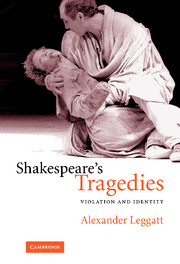Book contents
- Frontmatter
- Contents
- Acknowledgements
- A note on the texts
- Introduction
- 1 Titus Andronicus: This was thy daughter
- 2 Romeo and Juliet: What's in a name?
- 3 Hamlet: A figure like your father
- 4 Troilus and Cressida: This is and is not Cressid
- 5 Othello: I took you for that cunning whore of Venice
- 6 King Lear: We have no such daughter
- 7 Macbeth: A deed without a name
- Conclusion
- Notes
- Index
Introduction
Published online by Cambridge University Press: 22 September 2009
- Frontmatter
- Contents
- Acknowledgements
- A note on the texts
- Introduction
- 1 Titus Andronicus: This was thy daughter
- 2 Romeo and Juliet: What's in a name?
- 3 Hamlet: A figure like your father
- 4 Troilus and Cressida: This is and is not Cressid
- 5 Othello: I took you for that cunning whore of Venice
- 6 King Lear: We have no such daughter
- 7 Macbeth: A deed without a name
- Conclusion
- Notes
- Index
Summary
Shakespeare's first tragedy, Titus Andronicus, centers on an act of violation. Titus' daughter Lavinia has been raped in the woods by the Goths Chiron and Demetrius. They cut out her tongue and cut off her hands, taking language away from her. Her uncle Marcus finds her and brings her back to Rome, and to her father. What follows is a moment whose implications resonate throughout this play, and through the plays that follow. Titus at first does not recognize her: “But who comes with our brother Marcus here?” Marcus presents her with the words: “This was thy daughter.” Titus replies, “Why, Marcus, so she is” (III.i.63–64). The question is not, what has happened to her? but, who is she? Her body mutilated and her language gone, she seems to Marcus no longer Lavinia but a nameless thing that used to be Lavinia. But for Titus, she is still Lavinia.
Shakespeare's interest in the idea of violation has been examined by critics from a number of angles. To name only two, Linda Woodbridge sees it in cultural terms, in the light of what she calls “magical thinking”; Heather Dubrow relates it to invasions of domestic space. I would like to trace the idea of violation and its implications through the working of the play text itself. Titus Andronicus is not just a cultural document but a play – an early, self-conscious play at that.
- Type
- Chapter
- Information
- Shakespeare's TragediesViolation and Identity, pp. 1 - 7Publisher: Cambridge University PressPrint publication year: 2005



